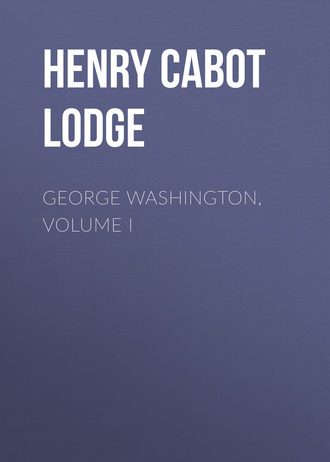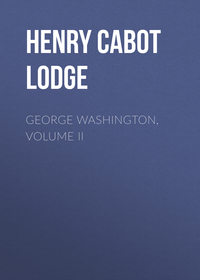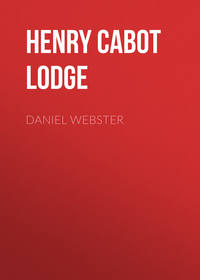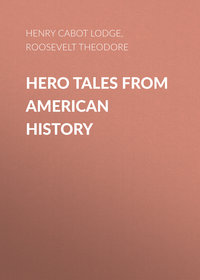 полная версия
полная версияGeorge Washington, Volume I
This little skirmish made a prodigious noise in its day, and was much heralded in France. The French declared that Jumonville, the leader, who fell at the first fire, was foully assassinated, and that he and his party were ambassadors and sacred characters. Paris rang with this fresh instance of British perfidy, and a M. Thomas celebrated the luckless Jumonville in a solemn epic poem in four books. French historians, relying on the account of the Canadian who escaped, adopted the same tone, and at a later day mourned over this black spot on Washington's character. The French view was simple nonsense. Jumonville and his party, as the papers found on Jumonville showed, were out on a spying and scouting expedition. They were seeking to surprise the English when the English surprised them, with the usual backwoods result. The affair has a dramatic interest because it was the first blood shed in a great struggle, and was the beginning of a series of world-wide wars and social and political convulsions, which terminated more than half a century later on the plains of Waterloo. It gave immortality to an obscure French officer by linking his name with that of his opponent, and brought Washington for the moment before the eyes of the world, which little dreamed that this Virginian colonel was destined to be one of the principal figures in the great revolutionary drama to which the war then beginning was but the prologue.
Washington, for his part, well satisfied with his exploit, retraced his steps, and having sent his prisoners back to Virginia, proceeded to consider his situation. It was not a very cheerful prospect. Contrecoeur, with the main body of the French and Indians, was moving down from the Monongahela a thousand strong. This of course was to have been anticipated, and it does not seem to have in the least damped Washington's spirits. His blood was up, his fighting temper thoroughly roused, and he prepared to push on. Colonel Fry had died meanwhile, leaving Washington in command; but his troops came forward, and also not long after a useless "independent" company from South Carolina. Thus reinforced Washington advanced painfully some thirteen miles, and then receiving sure intelligence of the approach of the French in great force fell back with difficulty to the Great Meadows, where he was obliged by the exhausted condition of his men to stop. He at once resumed work on Fort Necessity, and made ready for a desperate defense, for the French were on his heels, and on July 3 appeared at the Meadows. Washington offered battle outside the fort, and this being declined withdrew to his trenches, and skirmishing went on all day. When night fell it was apparent that the end had come. The men were starved and worn out. Their muskets in many cases were rendered useless by the rain, and their ammunition was spent. The Indians had deserted, and the foe outnumbered them four to one. When the French therefore offered a parley, Washington was forced reluctantly to accept. The French had no stomach for the fight, apparently, and allowed the English to go with their arms, exacting nothing but a pledge that for a year they would not come to the Ohio.
So ended Washington's first campaign. His friend the Half-King, the celebrated Seneca chief, Thanacarishon, who prudently departed on the arrival of the French, has left us a candid opinion of Washington and his opponents. "The colonel," he said, "was a good-natured man, but had no experience; he took upon him to command the Indians as his slaves, and would have them every day upon the scout and to attack the enemy by themselves, but would by no means take advice from the Indians. He lay in one place from one full moon to the other, without making any fortifications, except that little thing on the meadow; whereas, had he taken advice, and built such fortifications as I advised him, he might easily have beat off the French. But the French in the engagement acted like cowards, and the English like fools."5
There is a deal of truth in this opinion. The whole expedition was rash in the extreme. When Washington left Will's Creek he was aware that he was going to meet a force of a thousand men with only a hundred and fifty raw recruits at his back. In the same spirit he pushed on; and after the Jumonville affair, although he knew that the wilderness about him was swarming with enemies, he still struggled forward. When forced to retreat he made a stand at the Meadows and offered battle in the open to his more numerous and more prudent foes, for he was one of those men who by nature regard courage as a substitute for everything, and who have a contempt for hostile odds. He was ready to meet any number of French and Indians with cheerful confidence and with real pleasure. He wrote, in a letter which soon became famous, that he loved to hear bullets whistle, a sage observation which he set down in later years as a folly of youth. Yet this boyish outburst, foolish as it was, has a meaning to us, for it was essentially true. Washington had the fierce fighting temper of the Northmen. He loved battle and danger, and he never ceased to love them and to give way to their excitement, although he did not again set down such sentiments in boastful phrase that made the world laugh. Men of such temper, moreover, are naturally imperious and have a fine disregard of consequences, with the result that their allies, Indian or otherwise, often become impatient and finally useless. The campaign was perfectly wild from the outset, and if it had not been for the utter indifference to danger displayed by Washington, and the consequent timidity of the French, that particular body of Virginians would have been permanently lost to the British Empire.
But we learn from all this many things. It appears that Washington was not merely a brave man, but one who loved fighting for its own sake. The whole expedition shows an arbitrary temper and the most reckless courage, valuable qualities, but here unrestrained, and mixed with very little prudence. Some important lessons were learned by Washington from the rough teachings of inexorable and unconquerable facts. He received in this campaign the first taste of that severe experience which by its training developed the self-control and mastery of temper for which he became so remarkable. He did not spring into life a perfect and impossible man, as is so often represented. On the contrary, he was educated by circumstances; but the metal came out of the furnace of experience finely tempered, because it was by nature of the best and with but little dross to be purged away. In addition to all this he acquired for the moment what would now be called a European reputation. He was known in Paris as an assassin, and in England, thanks to the bullet letter, as a "fanfaron" and brave braggart. With these results he wended his way home much depressed in spirits, but not in the least discouraged, and fonder of fighting than ever.
Virginia, however, took a kinder view of the campaign than did her defeated soldier. She appreciated the gallantry of the offer to fight in the open and the general conduct of the troops, and her House of Burgesses passed a vote of thanks to Washington and his officers, and gave money to his men. In August he rejoined his regiment, only to renew the vain struggle against incompetence and extravagance, and as if this were not enough, his sense of honor was wounded and his temper much irritated by the governor's playing false to the prisoners taken in the Jumonville fight. While thus engaged, news came that the French were off their guard at Fort Duquesne, and Dinwiddie was for having the regiment of undisciplined troops march again into the wilderness. Washington, however, had learned something, if not a great deal, and he demonstrated the folly of such an attempt in a manner too clear to be confuted.
Meantime the Burgesses came together, and more money being voted, Dinwiddie hit on a notable plan for quieting dissensions between regulars and provincials by dividing all the troops into independent companies, with no officer higher than a captain. Washington, the only officer who had seen fighting and led a regiment, resented quite properly this senseless policy, and resigning his commission withdrew to Mount Vernon to manage the estate and attend to his own affairs. He was driven to this course still more strongly by the original cause of Dinwiddie's arrangement. The English government had issued an order that officers holding the king's commission should rank provincial officers, and that provincial generals and field officers should have no rank when a general or field officer holding a royal commission was present. The degradation of being ranked by every whipper-snapper who might hold a royal commission by virtue, perhaps, of being the bastard son of some nobleman's cast-off mistress was more than the temper of George Washington at least could bear, and when Governor Sharpe, general by the king's commission, and eager to secure the services of the best fighter in Virginia, offered him a company and urged his acceptance, he replied in language that must have somewhat astonished his excellency. "You make mention in your letter," he wrote to Colonel Fitzhugh, Governor Sharpe's second in command, "of my continuing in the service, and retaining my colonel's commission. This idea has filled me with surprise; for, if you think me capable of holding a commission that has neither rank nor emolument annexed to it, you must entertain a very contemptible opinion of my weakness, and believe me to be more empty than the commission itself.... In short, every captain bearing the king's commission, every half-pay officer, or others, appearing with such a commission, would rank before me.... Yet my inclinations are strongly bent to arms."
It was a bitter disappointment to withdraw from military life, but Washington had an intense sense of personal dignity; not the small vanity of a petty mind, but the quality of a proud man conscious of his own strength and purpose. It was of immense value to the American people at a later day, and there is something very instructive in this early revolt against the stupid arrogance which England has always thought it wise to display toward this country. She has paid dearly for indulging it, but it has seldom cost her more than when it drove Washington from her service, and left in his mind a sense of indignity and injustice.
Meantime this Virginian campaigning had started a great movement. England was aroused, and it was determined to assail France in Nova Scotia, from New York and on the Ohio. In accordance with this plan General Braddock arrived in Virginia February 20, 1755, with two picked regiments, and encamped at Alexandria. Thither Washington used to ride and look longingly at the pomp and glitter, and wish that he wore engaged in the service. Presently this desire became known, and Braddock, hearing of the young Virginian's past experience, offered him a place on his staff with the rank of colonel where he would be subject only to the orders of the general, and could serve as a volunteer. He therefore accepted at once, and threw himself into his new duties with hearty good-will. Every step now was full of instruction. At Annapolis he met the governors of the other colonies, and was interested and attracted by this association with distinguished public men. In the army to which he was attached he studied with the deepest attention the best discipline of Europe, observing everything and forgetting nothing, thus preparing himself unconsciously to use against his teachers the knowledge he acquired.
He also made warm friends with the English officers, and was treated with consideration by his commander. The universal practice of all Englishmen at that time was to behave contemptuously to the colonists, but there was something about Washington which made this impossible. They all treated him with the utmost courtesy, vaguely conscious that beneath the pleasant, quiet manner there was a strength of character and ability such as is rarely found, and that this was a man whom it was unsafe to affront. There is no stronger instance of Washington's power of impressing himself upon others than that he commanded now the respect and affection of his general, who was the last man to be easily or favorably affected by a young provincial officer.
Edward Braddock was a veteran soldier, a skilled disciplinarian, and a rigid martinet. He was narrow-minded, brutal, and brave. He had led a fast life in society, indulging in coarse and violent dissipations, and was proud with the intense pride of a limited intelligence and a nature incapable of physical fear. It would be difficult to conceive of a man more unfit to be entrusted with the task of marching through the wilderness and sweeping the French from the Ohio. All the conditions which confronted him were unfamiliar and beyond his experience. He cordially despised the provincials who were essential to his success, and lost no opportunity of showing his contempt for them. The colonists on their side, especially in Pennsylvania, gave him, unfortunately, only too much ground for irritation and disgust. They were delighted to see this brilliant force come from England to fight their battles, but they kept on wrangling and holding back, refusing money and supplies, and doing nothing. Braddock chafed and delayed, swore angrily, and lingered still. Washington strove to help him, but defended his country fearlessly against wholesale and furious attacks.
Finally the army began to move, but so slowly and after so much delay that they did not reach Will's Creek until the middle of May. Here came another exasperating pause, relieved only by Franklin, who, by giving his own time, ability, and money, supplied the necessary wagons. Then they pushed on again, but with the utmost slowness. With supreme difficulty they made an elaborate road over the mountains as they marched, and did not reach the Little Meadows until June 16. Then at last Braddock turned to his young aide for the counsel which had already been proffered and rejected many times. Washington advised the division of the army, so that the main body could hurry forward in light marching order while a detachment remained behind and brought up the heavy baggage. This plan was adopted, and the army started forward, still too heavily burdened, as Washington thought, but in somewhat better trim for the wilderness than before. Their progress, quickened as it was, still seemed slow to Washington, but he was taken ill with a fever, and finally was compelled by Braddock to stop for rest at the ford of Youghiogany. He made Braddock promise that he should be brought up before the army reached Fort Duquesne, and wrote to his friend Orme that he would not miss the impending battle for five hundred pounds.
As soon as his fever abated a little he left Colonel Dunbar, and, being unable to sit on a horse, was conveyed to the front in a wagon, coming up with the army on July 8. He was just in time, for the next day the troops forded the Monongahela and marched to attack the fort. The splendid appearance of the soldiers as they crossed the river roused Washington's enthusiasm; but he was not without misgivings. Franklin had already warned Braddock against the danger of surprise, and had been told with a sneer that while these savages might be a formidable enemy to raw American militia, they could make no impression on disciplined troops. Now at the last moment Washington warned the general again and was angrily rebuked.
The troops marched on in ordered ranks, glittering and beautiful. Suddenly firing was heard in the front, and presently the van was flung back on the main body. Yells and war-whoops resounded on every side, and an unseen enemy poured in a deadly fire. Washington begged Braddock to throw his men into the woods, but all in vain. Fight in platoons they must, or not at all. The result was that they did not fight at all. They became panic-stricken, and huddled together, overcome with fear, until at last when Braddock was mortally wounded they broke in wild rout and fled. Of the regular troops, seven hundred, and of the officers, who showed the utmost bravery, sixty-two out of eighty-six, were killed or wounded. Two hundred Frenchmen and six hundred Indians achieved this signal victory. The only thing that could be called fighting on the English side was done by the Virginians, "the raw American militia," who, spread out as skirmishers, met their foes on their own ground, and were cut off after a desperate resistance almost to a man.
Washington at the outset flung himself headlong into the fight. He rode up and down the field, carrying orders and striving to rally "the dastards," as he afterwards called the regular troops. He endeavored to bring up the artillery, but the men would not serve the guns, although to set an example he aimed and discharged one himself. All through that dreadful carnage he rode fiercely about, raging with the excitement of battle, and utterly exposed from beginning to end. Even now it makes the heart beat quicker to think of him amid the smoke and slaughter as he dashed hither and thither, his face glowing and his eyes shining with the fierce light of battle, leading on his own Virginians, and trying to stay the tide of disaster. He had two horses shot under him and four bullets through his coat. The Indians thought he bore a charmed life, while his death was reported in the colonies, together with his dying speech, which, he dryly wrote to his brother, he had not yet composed.
When the troops broke it was Washington who gathered the fugitives and brought off the dying general. It was he who rode on to meet Dunbar, and rallying the fugitives enabled the wretched remnants to take up their march for the settlements. He it was who laid Braddock in the grave four days after the defeat, and read over the dead the solemn words of the English service. Wise, sensible, and active in the advance, splendidly reckless on the day of battle, cool and collected on the retreat, Washington alone emerged from that history of disaster with added glory. Again he comes before us as, above all things, the fighting man, hot-blooded and fierce in action, and utterly indifferent to the danger which excited and delighted him. But the earlier lesson had not been useless. He now showed a prudence and wisdom in counsel which were not apparent in the first of his campaigns, and he no longer thought that mere courage was all-sufficient, or that any enemy could be despised. He was plainly one of those who could learn. His first experience had borne good fruit, and now he had been taught a series of fresh and valuable lessons. Before his eyes had been displayed the most brilliant European discipline, both in camp and on the march. He had studied and absorbed it all, talking with veterans and hearing from them many things that he could have acquired nowhere else. Once more had he been taught, in a way not to be forgotten, that it is never well to underrate one's opponent. He had looked deeper, too, and had seen what the whole continent soon understood, that English troops were not invincible, that they could be beaten by Indians, and that they were after all much like other men. This was the knowledge, fatal in after days to British supremacy, which Braddock's defeat brought to Washington and to the colonists, and which was never forgotten. Could he have looked into the future, he would have seen also in this ill-fated expedition an epitome of much future history. The expedition began with stupid contempt toward America and all things American, and ended in ruin and defeat. It was a bitter experience, much heeded by the colonists, but disregarded by England, whose indifference was paid for at a heavy cost.
After the hasty retreat, Colonel Dunbar, stricken with panic, fled onward to Philadelphia, abandoning everything, and Virginia was left naturally in a state of great alarm. The assembly came together, and at last, thoroughly frightened, voted abundant money, and ordered a regiment of a thousand men to be raised. Washington, who had returned to Mount Vernon ill and worn-out, was urged to solicit the command, but it was not his way to solicit, and he declined to do so now. August 14, he wrote to his mother: "If it is in my power to avoid going to the Ohio again, I shall; but if the command is pressed upon me by the general voice of the country, and offered upon such terms as cannot be objected against, it would reflect dishonor on me to refuse it." The same day he was offered the command of all the Virginian forces on his own terms, and accepted. Virginia believed in Washington, and he was ready to obey her call.
He at once assumed command and betook himself to Winchester, a general without an army, but still able to check by his presence the existing panic, and ready to enter upon the trying, dreary, and fruitless work that lay before him. In April, 1757, he wrote: "I have been posted then, for more than twenty months past, upon our cold and barren frontiers, to perform, I think I may say, impossibilities; that is, to protect from the cruel incursions of a crafty, savage enemy a line of inhabitants, of more than three hundred and fifty miles in extent, with a force inadequate to the task." This terse statement covers all that can be said of the next three years. It was a long struggle against a savage foe in front, and narrowness, jealousy, and stupidity behind; apparently without any chance of effecting anything, or gaining any glory or reward. Troops were voted, but were raised with difficulty, and when raised were neglected and ill-treated by the wrangling governor and assembly, which caused much ill-suppressed wrath in the breast of the commander-in-chief, who labored day and night to bring about better discipline in camp, and who wrote long letters to Williamsburg recounting existing evils and praying for a new militia law.
The troops, in fact, were got out with vast difficulty even under the most stinging necessity, and were almost worthless when they came. Of one "noble captain" who refused to come, Washington wrote: "With coolness and moderation this great captain answered that his wife, family, and corn were all at stake; so were those of his soldiers; therefore it was impossible for him to come. Such is the example of the officers; such the behavior of the men; and upon such circumstances depends the safety of our country!" But while the soldiers were neglected, and the assembly faltered, and the militia disobeyed, the French and Indians kept at work on the long, exposed frontier. There panic reigned, farmhouses and villages went up in smoke, and the fields were reddened with slaughter at each fresh incursion. Gentlemen in Williamsburg bore these misfortunes with reasonable fortitude, but Washington raged against the abuses and the inaction, and vowed that nothing but the imminent danger prevented his resignation. "The supplicating tears of the women," he wrote, "and moving petitions of the men melt me into such deadly sorrow that I solemnly declare, if I know my own mind, I could offer myself a willing sacrifice to the butchering enemy, provided that would contribute to the people's ease." This is one of the rare flashes of personal feeling which disclose the real man, warm of heart and temper, full of human sympathy, and giving vent to hot indignation in words which still ring clear and strong across the century that has come and gone.
Serious troubles, moreover, were complicated by petty annoyances. A Maryland captain, at the head of thirty men, undertook to claim rank over the Virginian commander-in-chief because he had held a king's commission; and Washington was obliged to travel to Boston in order to have the miserable thing set right by Governor Shirley. This affair settled, he returned to take up again the old disheartening struggle, and his outspoken condemnation of Dinwiddie's foolish schemes and of the shortcomings of the government began to raise up backbiters and malcontents at Williamsburg. "My orders," he said, "are dark, doubtful, and uncertain; to-day approved, to-morrow condemned. Left to act and proceed at hazard, accountable for the consequences, and blamed without the benefit of defense." He determined nevertheless to bear with his trials until the arrival of Lord Loudon, the new commander-in-chief, from whom he expected vigor and improvement. Unfortunately he was destined to have only fresh disappointment from the new general, for Lord Loudon was merely one more incompetent man added to the existing confusion. He paid no heed to the South, matters continued to go badly in the North, and Virginia was left helpless. So Washington toiled on with much discouragement, and the disagreeable attacks upon him increased. That it should have been so is not surprising, for he wrote to the governor, who now held him in much disfavor, to the speaker, and indeed to every one, with a most galling plainness. He was only twenty-five, be it remembered, and his high temper was by no means under perfect control. He was anything but diplomatic at that period of his life, and was far from patient, using language with much sincerity and force, and indulging in a blunt irony of rather a ferocious kind. When he was accused finally of getting up reports of imaginary dangers, his temper gave way entirely. He wrote wrathfully to the governor for justice, and added in a letter to his friend, Captain Peachey: "As to Colonel C.'s gross and infamous reflections on my conduct last spring, it will be needless, I dare say, to observe further at this time than that the liberty which he has been pleased to allow himself in sporting with my character is little else than a comic entertainment, discovering at one view his passionate fondness for your friend, his inviolable love of truth, his unfathomable knowledge, and the masterly strokes of his wisdom in displaying it. You are heartily welcome to make use of any letter or letters which I may at any time have written to you; for although I keep no copies of epistles to my friends, nor can remember the contents of all of them, yet I am sensible that the narrations are just, and that truth and honesty will appear in my writings; of which, therefore, I shall not be ashamed, though criticism may censure my style."





